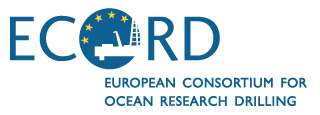ECORD bandisce una Special call rivolta a esperti in geochimica e sedimentologia/litostratigrafia (expertise in facies di deep water, traccianti isotopici, elementi in traccia e interazioni fluido-roccia dei processi geologici profondi), per partecipare alla IODP Exp. 358 NanTroSEIZE Plate Boundary Riser 4 a bordo della Chikyu (7 Ottobre 2018 - 21 Marzo 2019).
I candidati dovranno indicare la propria disponbilità a prendere parte alla cruise per una finestra temporale di 2-3 mesi (all'interno della quale verrà stabilito un turno di 4 o 6-8 settimane) e al samplig party, che sarà programmato nei mesi di Marzo-Aprile 2019 .
Maggiori dettagli sono riportati di seguito; Call e l'Application Form disponibili al link http://www.ecord.org/expeditions/apply-to-sail/
La documentazione richiesta nel bando dovrà essere trasmessa via email all'ESSAC Office essac@plymouth.ac.uk e in copia a iodp-italia@cnr.it (informazioni sulle possibilità di supporto iodp-Italia)
La SCADENZA per presentare le domande di partecipazione: 8 Giugno 2018.
Special Call: IODP Expedition 358 onboard Chikyu
SPECIAL CALL for geochemists and sedimentologists/lithostratigraphers to apply for IODP Expedition 358 NanTroSEIZE Plate Boundary Riser 4 onboard the Chikyu. We seek geochemists with specific expertise in researching elemental tracers from deep geological formations and processes from riser drilling mud gases, as well as scientists with expertise in sedimentology and lithostratigraphy.
The deadline to apply is June 8, 2018.
The International Ocean Discovery Program (IODP) is now accepting applications for Expedition 358 NanTroSEIZE Plate Boundary Riser 4 aboard the D/V Chikyu.
The NanTroSEIZE Complex Drilling Project is now reaching its penultimate phase: drilling and sampling the Plate Boundary at ~5200 mbsf, believed to be capable of seismogenic slip and locking, and where coseismic slip occurred during the 1944 Tonankai earthquake.
Primary objectives include continuous logging while drilling (LWD) data, analysis of mud gas and cuttings, and a regime of downhole measurements and tests. There is a limited coring program for the expected hanging wall and footwall of the plate boundary itself.
One special line of investigation concerns mud gas analysis via the onboard SciGas drilling mud gas monitoring system, which allows determination of hydrocarbons (methane, ethane, propane, i- and n-butane, propane), stable carbon isotopic composition of methane (δ13CCH4), and non-hydrocarbon (e.g., amongst others, O2, N2, Ar, H2, Xe, He) gases (Hammerschmidt, et al., 2014).
The expedition is currently planned to begin on 7 October 2018 and finish on 21 March 2019 (164 days). This expedition is planned for more than five months at sea and therefore will not be staffed in the standard expedition "shipboard scientific party" model. Specifically, for Expedition 358:
Scientific party member should make themselves available for time windows of 2-3 months' duration, during which they will likely be asked to board Chikyu for one or more 2 to 4 week "shifts."
All members of the scientific party will also be expected to participate in a final analysis and sampling meeting at the end of the expedition, anticipated to require several weeks in March or April of 2019.
Additional information about this expedition can be found in the Expedition 358 Call For Participation.
This is a special call for geochemists and sedimentologists/lithostratigraphers. We seek applications from: geochemical specialists with expertise in isotopic tracer and elemental analysis as proxies for deep geological processes, and experts in the field of deep-seated fluid-rock interactions; and sedimentologists and lithostratigraphers with expertise in deep-water marine clastic and hemipelagic sediments. The scientists will work closely with downhole logging data, structural geology and lithology to more fully characterize the plate boundary fault system.
Scientists from ECORD member countries interested in participating in this expedition should apply to sail through the ECORD website http://www.ecord.org/expeditions/apply-to-sail/
The deadline to apply for this special call is June 8, 2018.
The Application Process is open to scientists in all ECORD member countries. Please download the Apply to Sail general application forms from the ESSAC webpage:
http://www.ecord.org/expeditions/apply-to-sail/
Please, fill out all applicable fields and send it to the ESSAC office by email (essac@plymouth.ac.uk) with the following additional documents by the deadline of 8 June 2018:
- A letter of interest outlining your specific expertise, previous involvement in DSDP/ ODP/ IODP expeditions, research interests, primary research goals of your proposed participation.
- CV and publication list.
- Young researchers must additionally provide a letter of support from their host institution, including information on post-cruise science support.
All applications should state how you intend to achieve your proposed scientific objectives, with information on the funding scheme and support from your institution or national funding agencies. More information can be found under:
http://www.ecord.org/expeditions/apply-to-sail/
In addition to the ESSAC application, all applicants must inform their national office or national delegate and send them a copy of their application documents. The national offices or national delegates can also provide information regarding travel support, post-cruise funding opportunities, etc.
See http://www.ecord.org/about-ecord/about-us/ for a list of the national contact persons.
For further information or questions, please contact the ESSAC Office:
ECORD Science Support & Advisory Committee
Antony Morris (ESSAC Chair)
Hanno Kinkel (ESSAC Science Coordinator)
School of Geography, Earth and Environmental Sciences,
Plymouth University, UK
Drake Circus, Plymouth PL4 8AA, UK
e-mail: essac@plymouth.ac.uk
website: www.ecord.org

